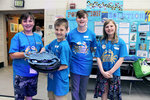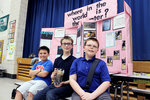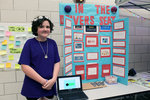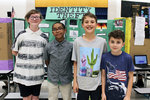 Riviera Beach
Riviera BeachOvercast, 53°
Wind: 9.2 mph, E
 Riviera Beach
Riviera Beach




Are you smarter than a fifth-grader?
Grade 5 students at Sunset Elementary School shared an impressive array of facts on May 8 when they displayed their Primary Years Programme (PYP) exhibition projects.
In Africa, the average family uses five gallons of water a day, according to Alex Strebel.
Two out of three people will be impacted by a drunk driving crash in their lifetime, said Kearah Frain.
Between 1973 and 1997, the amount of stormwater running into the aging sewer system of Washington, D.C., increased by 34%, explained a group of four kids who worked on a pollution project.
Kids spent six to eight weeks on the collaborative PYP projects, which challenged students to engage in an in-depth inquiry and take action. As an International Baccalaureate (IB) school, Sunset Elementary incorporates the exhibition into the fifth-grade curriculum each year to prepare students to become caring, lifelong learners who are able to understand diverse perspectives.
After learning about the United Nation global goals for sustainable development, students researched topics and made inventions, models and apps to solve problems.
“We introduced kids to these real-world problems and gave them the opportunity to decide what was important to them,” said Molly Courtien, the IB PYP coordinator. “They had to find a way to modify technology that already exists or create new technology. We had a range of issues from child abuse to water filtration.”
Alex Strebel was a member of the water filtration group.
“We hear all the time that there is a water scarcity problem in Africa,” Alex said. “People have to walk miles and miles to find a water source. But we learned the problem isn’t just scarcity; the water isn’t clean.”
Alex and his group made a filter to show the ease of providing clean water.
“We took the top of a 2-liter bottle and filled it with gravel, pebbles, wet sand, a coffee filter, cotton balls, rocks and minerals, and metal netting,” Alex said. “Then you pour the dirty water in.”
Water was also the focus for a group that studied pollution in the Chesapeake Bay.
“Everyone likes to come to the beach,” Zach Ridge said. “Imagine, one day, it is gone because there is too much plastic everywhere and pollution. You would be devastated.”
The fifth-graders made two models to show cleaning processes. One involved a tiny pool that contained oil-collecting sponges and the SpongeBob Bay Boat. The other model used a vacuum robot with a crab replica attached to the top.
“We made the SpongeBob Bay Boat to soak up the chemical pollution and the Grab Crab uses its claws to collect trash,” said Bryce Moyer.
Kearah Frain used Scratch to develop an app to stop people from driving drunk.
“A few years ago, my mom was in a car crash,” Kearah said. “Everyone was OK. At the time, I started thinking about what was with all the car crashes.”
Users can select the app and answer questions that help them find a ride home from an Uber, family member or friend. Kearah learned not only about the frequency of drunk driving incidents but also about coding.
“During the process, I had to make a lot of things move and disappear,” she said.
Izabela Miille and her teammates researched the movement and disappearance of human identities stolen by thieves.
“I was always kind of interested in hacking,” said Izabela, “and I was blown away by what I learned.”
Her team created a list of precautionary measures to keep people from being scammed. They also made a game demonstrating the potential consequences of sharing personal information with the wrong people.
Numerous other exhibits filled the Sunset cafeteria, including displays on poaching snow leopards, homelessness, underage smoking, safe sports equipment, child abuse, oil spills, coral reefs, hunger in the U.S., climate change, transgender allies, protecting the Amur leopard, loose pets, and pet abuse.
Teachers Charity Crawford, Allison Fleck and Amber Wilkins helped students with the projects, as did numerous mentors and experts who visited Sunset to educate kids on their topics.
“We hope this is a transformative process for them,” Courtien said. “It’s amazing to see the progress and how far they’ve come.”
Comments
No comments on this item Please log in to comment by clicking here